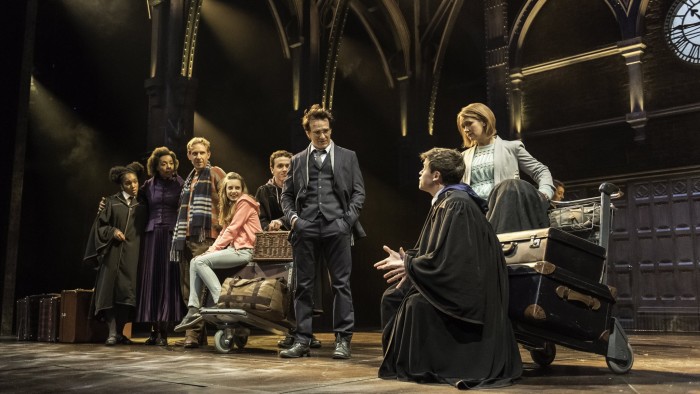Harry Potter and the Cursed Child, Palace Theatre, London — ‘Thrilling’

Simply sign up to the Life & Arts myFT Digest -- delivered directly to your inbox.
It has taken more than a drop of Polyjuice Potion to turn Harry Potter into this latest incarnation. J.K. Rowling has collaborated with playwright Jack Thorne and director John Tiffany to propel the narrative into a new medium for the series’ eighth instalment. Mutations — as Harry himself knows — can be risky. But here the spell has worked. The result, delivered in two parts, is thrilling: gripping, dark, wittily acted and often visually dazzling.
Above all, though, it succeeds because the team has put transformation right at the heart of the story, both structurally and emotionally. It’s a move that allows the drama to play to drama’s strengths — this is, after all, an art form that depends on an actor transfiguring before your eyes into someone else. And, amid all the epic fantasy, it homes in on the magic we all have at our fingertips: the ability to make a difference to another person.
Central to the narrative are the intimate themes of parenting, loss and grief that have underpinned the stories from the outset. Thorne’s script visits them from new angles, embracing the show’s double audience of adults and children. The much-loved trio — Harry, Hermione and Ron — are now in their mid-thirties, their character traits wittily teased out into adult form. Jamie Parker’s excellent Harry, a frazzled father and employee of the Ministry of Magic, combines flashes of his young, impulsive self with the wear and tear of parenthood. Noma Dumezweni’s Hermione is his wise, crisply efficient boss and Paul Thornley’s loveable Ron is a well-meaning joker.
There are neat but telling inversions. Where Harry, an orphan, found sanctuary at Hogwarts, his son Albus (Sam Clemmett, touchingly truculent and insecure) is miserable there, finding it tough to live up to his father’s name. Unexpectedly, he befriends Scorpius Malfoy (Anthony Boyle, charmingly gawky and awkward), who likewise struggles to shrug off the shadow of his notorious dad. (It’s a storyline that wryly acknowledges the show’s own challenge in living up to the hype.) Armed with teenage contrariness and zeal, Albus and Scorpius set off to try and right what they perceive to be a past wrong. What they don’t bargain for is just how much they might change.
The narrative loops back and forth, playing with time and consequence, creating a complex series of alternative realities. There are echoes of Back to the Future here, and one could take a dim view of so much recycled material. But it’s purposefully done, raises topical political questions about the way forks in the road lead to different futures and the main thrust is personal and ultimately immensely poignant. Fathers affect sons, sons affect fathers; we see people unfold into happy or sour adults, depending on how they are treated and the path they take. This can be playfully theatrical — and sometimes very funny — as the cast are able to morph before us into subtly different versions of their characters. It dances around the question posed by the title: who is the cursed child — and why?
On Christine Jones’s simple, wood-panelled set, Tiffany’s fluid staging is bound together by recurring motifs — suitcases, clocks, beds — that emphasise the significance of time and journeys. He grounds the story in theatrical make-believe: a case can be a gravestone. Jamie Harrison’s ingenious illusions also begin with simple magic tricks — Ron teasing his daughter by retrieving an object from behind her ear, as many an amateur magician might do — and the show drolly embeds the supernatural in the everyday. Need to tidy your desk? There’s a spell for that. But there are also many stunning effects and several hair-raising moments that make the most of the live presence of the audience in theatre.
It’s not all good news. Coming in at more than five hours in total, it’s long and bogged down by too much incident and too many characters: on stage you can’t turn back the pages and re-read any confusing bits. Some episodes seem superfluous, given the quantity of story we need to get through and such overload clogs the works and undercuts climaxes. But, overall, this is a triumph. For a bunch of muggles, the creative team has certainly brewed up a wizard show. Professor Snape would be proud.

Booking to May 2017,
harrypottertheplay.com
Comments